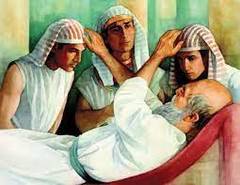Did The Jews Make Resolutions in Egypt?
01/03/2023 05:19:01 AM

According to the Talmud, keeping resolutions is all about who you make the resolution to. Making a promise to yourself is great. But at the same time, when you are able to go beyond yourself and realize that others are counting on you, then the chances that you will be able to keep the resolution go way up.
In this week’s Torah portion the Midrash (Rabbinic teachings and stories expanding the Torah narrative) presents a sort of New Years resolution that shines a new light on a Jewish practice that we all peform: saying Shema.
The Parsha (Torah portion) describes the passing of Jacob, otherwise known as Israel, the last and greatest of the patriarchs. Jacob is the son of Isaac who is the son of Abraham.
Jacob’s final years are spent in the land of Goshen, Egypt, surrounded by his children and grandchildren, attended by his loving daughter-in-law, Asenath and beloved Joseph, viceroy of Egypt.
Now, at the age of one hundred and forty seven, his days are coming to an end. Summoning his twelve sons, he looks out at them standing before him and a sudden fear fills his heart.
Look at you, he says. You have all adopted Egyptian ways, manners and customs. Your children and their children will assimilate still more. You will forget your heritage, the Covenant with G-d, the saga of our family and the promise to someday leave this land and return home. You will worship the gods of Egypt and melt away over the generations. It will all be for nought.
The Midrash says that the brothers, founders of the Tribes of Israel, made a resolution then and there and declared it to their dying father loud and clear.
Listen, Israel our father, Adonai is our G-d: Adonai, the One and Only!
When Jacob hears this powerful declaration, made to him by his children but also made by his children to each other and to their children, he bows on the bed and murmurs, Baruch Shem K’vod Malchuto L’Olam Vaed- Thank G-d! He knows at that moment that his children and their descendants will remain faithful forever.
And they did. It was only that determination at that moment that made their descendants worthy of the great miracles that would accompany the Exodus and make that act of liberation the beginning of human freedom and G-d’s revelation.
We continue that same resolution today. When we say the Shema, we are making a statement to those who came before us, like the twelve children to their father. We are also making a statement to each other.. Finally, we are making a statement to the future.
The Twelve Tribes of Israel correspond to the twelve months of the year. No one knows what the year ahead will bring, but maintaining that connection and commitment with our past, with each other and with the Jewish future? That paves the way for resilience, strength and blessing. Shema Yisrael is a resolution that we can all keep. Shabbat Shalom!
